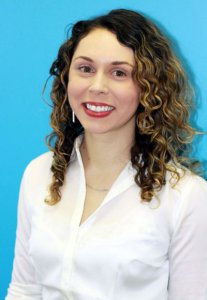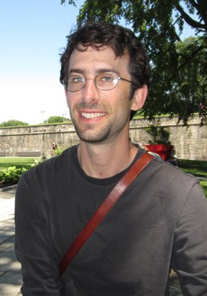
The right fit
By Claire Zimmerman
 When Leslie Gallagher (BA’12) graduated in 2012 with a degree in English and Creative Writing, she knew exactly what she wanted to do: work in editing or publishing. So she drew up a list of every Halifax business in the field and started cold calling. She landed a summer internship with Atlantic Canada’s business and entrepreneurship magazine, Progress, and within two years, was promoted three times, up to associate editor.
When Leslie Gallagher (BA’12) graduated in 2012 with a degree in English and Creative Writing, she knew exactly what she wanted to do: work in editing or publishing. So she drew up a list of every Halifax business in the field and started cold calling. She landed a summer internship with Atlantic Canada’s business and entrepreneurship magazine, Progress, and within two years, was promoted three times, up to associate editor.
“My job there developed because I fell in love with the place, and tried to learn more about it every day,” Gallagher says. Working for Progress provided her with the opportunity to connect with small business owners, and she was surprised to discover that most of them struggled to hire people locally. “I was stunned,” she said. “I realized what a huge gap there is between small businesses looking to hire and job seekers.” So she left her job at Progress and founded WorkLocal.jobs.
WorkLocal.jobs is what Gallagher calls an innovative job board. “Candidates can apply to jobs by recording short video interview messages for the employer, based on questions the employer chooses. We use technology to show employers the whole person, not just the résumé, so they can find local talent that’s qualified, but also a great fit for their company. And job seekers can find companies where they’ll truly be happy working.”
In a time when a university degree no longer dictates a clear career path, the job search can be both confusing and discouraging. “I think especially with universities, where often your education isn’t directly lined up to one specific career, you have to look at how what you’re learning is transferrable,” Gallagher explains. “The résumé doesn’t say enough about candidates—and the person who may be right for the job gets lost in the stack. I wanted to change that, and give employers more than just the watered down ‘professional’ version of you on your résumé.”
The advantage of being a generalist
 Dan Scott (MPlan’11) is a good example of someone whose degree and career don’t exactly line up. He finished his master’s degree in urban planning at Dalhousie in 2011, and worked as a community planner with the Cities & Environment Unit at Dalhousie. After two years he started looking for another job. Scott wanted to stay in Halifax, where he’d already started a family, but struggled to find planning jobs available locally. Then he discovered an opening in the publishing office at Mindful, a magazine focusing on mindful living, and his career took a major shift. Part of being able to switch from planning to publishing, he says, was being a generalist.
Dan Scott (MPlan’11) is a good example of someone whose degree and career don’t exactly line up. He finished his master’s degree in urban planning at Dalhousie in 2011, and worked as a community planner with the Cities & Environment Unit at Dalhousie. After two years he started looking for another job. Scott wanted to stay in Halifax, where he’d already started a family, but struggled to find planning jobs available locally. Then he discovered an opening in the publishing office at Mindful, a magazine focusing on mindful living, and his career took a major shift. Part of being able to switch from planning to publishing, he says, was being a generalist.
“Not being overly specialized, I think, has an advantage,” Scott says. “Resourcefulness is something I gained from my master’s degree – being able to understand and learn things quickly, to research, to pull things together.”
Scott started as a general employee filling gaps where needed. A little more than a year in, his job morphed: he moved into the circulation department, became assistant publisher, and has since set himself up on a solid career path. “It was a steep learning curve coming to publishing,” he says, “But part of the opportunity I’ve had is the space to learn and to engage with the business. That was the circumstance – the right place, right people, right time, right fit. Another publishing company would not be the same for me.”
Finding the right fit
Finding that right fit is an often ignored yet crucial part of finding a job, Gallagher says, and it’s one of the key values of WorkLocal.jobs.
“Often someone who is a great fit for their organization is just as important to employers as someone who has the right work experience or the right hard skills,” Gallagher says. “[Employers] can train for those things, but they can’t train someone to be ambitious, or friendly.” Personal strengths and attributes, such as adaptability, creativity, persistence, or leadership, generally lead to a better fit for both employers and employees than if job-seekers only have a résumé, which emphasizes credentials or accomplishments.
Finding the right fit isn’t all about finding the right employer; it also involves figuring out what you want to do. Gallagher’s advice: explore new things and don’t settle for less than total passion.
One of her favourite ways to discover new things is to network. “Take interesting people for coffee,” she says. “If you’re interested in what someone does or how they do it, ask if you can buy them a coffee and when you meet up, have a few questions prepared that you want to ask them. It’s a great way to build your network and learn new things.”
Look for new combinations
Two of Gallagher’s favourite classes at Dalhousie were “Writing Theory” and “Writing Practice.” More than teaching her to edit, they showed her the value of collaboration and finding inspiration in others’ work, she says. “This really helped me as an entrepreneur – if you try to do everything yourself, and don’t ask for advice, guidance, or feedback, you’re going to fail. You also need to learn to recognize your weaknesses and work with people who balance those out.” To figure out how your passion can become a real, paying job, she says, “keep combining what you love with new areas by applying it to other disciplines. See what you discover.”
Both Scott and Gallagher set out on very different career paths than they’re now traveling thanks to their transferrable skills – from writing to entrepreneurship, from urban planning to magazine publishing. Things change. And when they do, you might just stumble upon your passion.